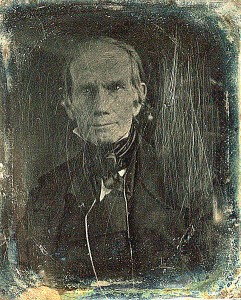Henry Clay was called the “Great Compromiser” because of his work in the U.S. Congress during the North-South crises, especially in 1820 and 1850. The correspondent in this article says that Clay, who died in 1852, would not have compromised on nullification and secession.
From The New-York Times. November 15, 1860:
What Shall be Done with a Seceding State? Henry Clay’s Opinion.
Correspondence of the New-York Times
LOUISVILLE, Ky., Saturday, Nov. 10, 1860.
I remember well how Mr. CLAY used to talk, write and speak on this point. Though when on the brink of the grave, his eye flashed with its old fire, his form rose to its full height, and his voice recovered its commanding tone, whenever secession was even alluded to in his presence. …
HENRY CLAY’s general opinion of the way to treat secession and nullification, as I heard him state it publicly and privately, and as he expressed it in his letter of Oct. 3, 1851, to DANIEL ULLMAN and others of your City, was this:
“Suppose the standard should be raised, of open resistance to the Union, the Constitution, and the laws, what is to be done? There can be but one possible answer. The power, the authority, and the dignity of the Government ought to be maintained, and resistance put down at every hazard. The duty of executing the laws and suppressing insurrections is without limitation or qualification; it is coextensive with the jurisdiction of the United States. No human Government can exist without the power of applying force, and the actual application of it in extreme cases. My belief is that if it should be applied to South Carolina, in the event of her secession, she would be speedily reduced to obedience, and that the Union, instead of being weakened, would acquire additional strength.”
My question is: what would Clay have said about the northern states who refused to enforce The Fugitive Slave Act of 1850, effectively nullifying it in their states? The Fugitive Slave Act was part of the Compromise of 1850 that Clay helped broker. Many northern states were not following that law.

